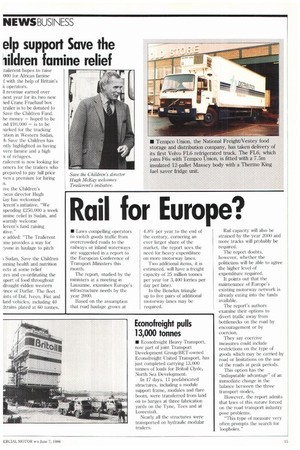Rail for Europe?
Page 15

If you've noticed an error in this article please click here to report it so we can fix it.
• Laws compelling operators to switch goods traffic from overcrowded roads to the railways or inland waterways are suggested in a report to the European Conference of Transport Ministers this month.
The report, studied by the ministers at a meeting in Lausanne, examines Europe's infrastructure needs by the year 2000.
Based on the assumption that road haulage grows at 4.8% per year to the end of the century, cornering an ever larger share of the market, the report sees the need for heavy expenditure on more motorway lanes.
Two additional items, it is estimated, will have a freight capacity of 25 million tonnes per year (or 3,400 lorries per day per lane).
In the Benelux triangle up to five pairs of additional motorway lanes may be required. Rail capacity will also be strained by the year 2000 and more trucks will probably be required.
The report doubts, however, whether the politicians will he able to agree the higher level of expenditure required.
It points out that the maintenance of Europe's existing motorway network is already eating into the funds available.
The report's authors examine their options to divert traffic away from bottlenecks on the road by encouragement or by
coercion.
They say coercive measures could include restrictions on the type of goods which may be carried by road or limitations on the use of the roads at peak periods.
This option has the -indisputable advantage" of an inmediate change in the balance between the three transport modes.
However, the report admits that laws of this nature forced on the road transport industry pose problems.
"This type of measure very often prompts the search for loopholes."




























































